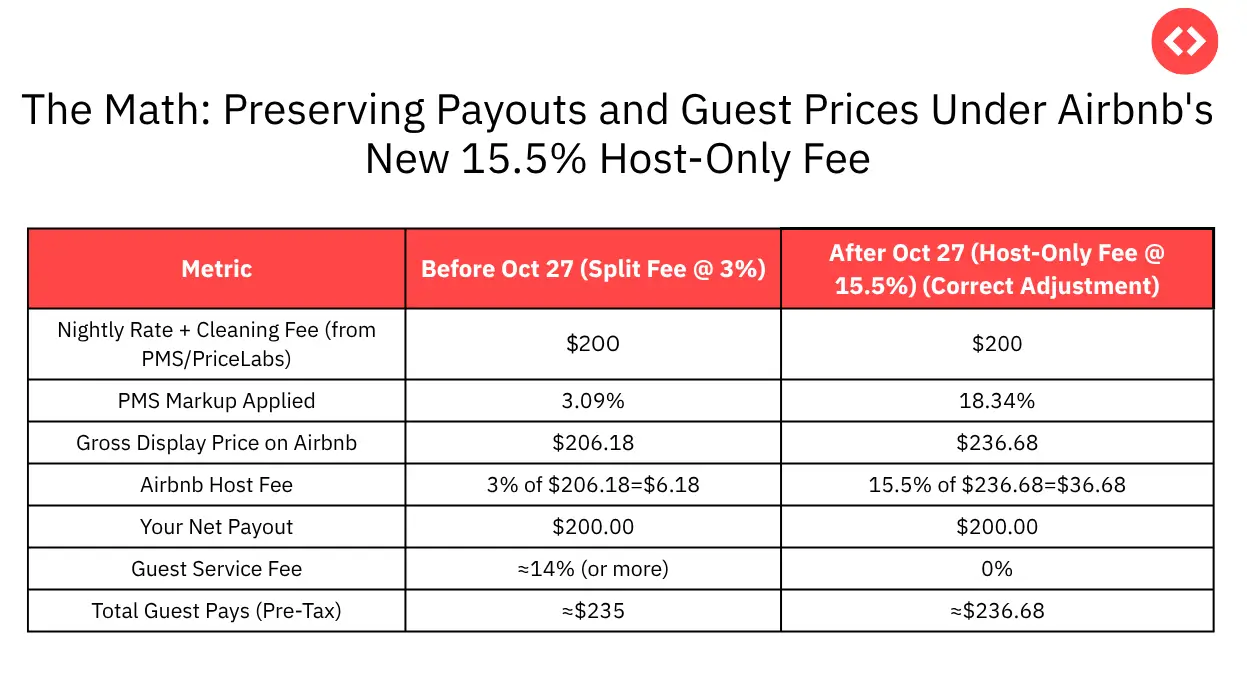Navigating the New Airbnb Host Fee: A Property Manager’s Guide to the 15.5% Commission
A significant shift is underway on Airbnb that affects professional vacation rental operators worldwide. Starting on October 27, 2025, most hosts connected to a Property Management System (PMS) will automatically transition from the former “split fee” model (where the host pays ≈3% and the guest pays approximately 14%-16%) to a standardized 15.5% Host-Only Fee.
This change is not just a policy update; it’s a critical moment for revenue management. Without correct price adjustments, property managers risk a significant drop in net payouts.
This detailed guide created using PriceLabs Masterclass featuring industry experts Thibault Masson, Head of Product Marketing at PriceLabs and Founder at RentalScaleUp, John An, CEO at TechTape, Theoharis Mihailidis, Owner at Villarentals.gr, and Monique DeLorenzo, Senior Solutions Consultant at PriceLabs, provides the essential information and math you need to adapt immediately.
1. The Critical Math: Why Your Markup Must Be 18.34%
The most common mistake is assuming you only need to increase your price by 15.5% to cover the fee. This is incorrect because Airbnb’s payment is calculated on the final, marked-up price.
To ensure your net payout remains the same as before the change, you must apply a specific markup to your prices.
- Airbnb’s Host-Only Fee: 15.5% (taken from the gross price)
- Required PMS Markup: ≈18.34%
- Example: Moving from 3% Split Fee (US-based PMS Hosts)
If you were previously on the split-fee model (3% host fee + approximately 14% guest fee), your PMS markup was likely set at approximately 3.09% to maintain a consistent net payout.

By adjusting your markup to 18.34%, the guest’s final price remains nearly identical to what they paid under the split-fee structure. Now, the fee is internal, and your payout is preserved.
Protect Your Payouts. Stop Margin Loss.
The 18.34% markup is non-negotiable for preserving revenue. Use PriceLabs dynamic pricing and Neighborhood Data tools to apply the correct adjustment and instantly verify your competitive position on Airbnb.
Sign Up For Free trial2. Actionable Steps to Take Now
To avoid a reduction in your net payouts, it is advised that you act before the October 27th deadline, since after that the new structure will be implemented and you will risk losing revenue if you don’t adjust your fee accordingly.
Update Your PMS Markup:
This is the most crucial step. Log in to your PMS/channel manager and adjust the specific Airbnb channel markup to 18.34%.
As expert Monique DeLorenzo noted, “If you’re scrambling right now to put into effect a book direct strategy, rather than make these adjustments, I think that actually wouldn’t be as prudent as just making the adjustments”.
Adjust All Fees (Cleaning, Extra Guests, etc.):
Airbnb’s 15.5% fee applies to the entire booking subtotal, including nightly rates, cleaning fees, and other mandatory fees.
John An advises: “If you don’t want to eat that cost, you need to mark that up., including cleaning”. Monique DeLorenzo adds that “all of those extra fees should be updated”.
Use Data to Stay Competitive:
While the math preserves your net, competition might adjust differently.
Monique DeLorenzo suggests using Pricelabs’ tools: “We have a handy tool in a section called Neighborhood Data, where you’re able to compare your pricing with that markup compared to the rest of the market”.
3. Why Airbnb Is Making This Change
This move aligns Airbnb’s fee structure with that of its main OTA competitors, such as Booking.com, which have historically employed the host-only commission model.
Guest Conversion:
Research shows that eliminating a separate “service fee” line item—the guest fee—improves conversion. “The only thing that’s gonna change is that when you click this and everyone migrates over to the host-only fee, you’re no longer going to see this Airbnb service fee,” explains Monique DeLorenzo.
Pricing Transparency:
The change creates a more transparent experience for the guest, as the displayed search price is the final price they pay (pre-tax).
OTA Parity and Control:
John An points out the bigger picture: “The challenging part now is… if you have a large portfolio, this actually becomes, probably a day’s worth of work, you know, kind of coordinating everything”. He also analogizes the change to major e-commerce platforms, stating, “Airbnb is to Amazon, as direct booking is to Shopify”.
4. Strategic Implications: Direct Bookings and Other OTAs
The transition underscores the need for a diversified distribution and Airbnb pricing strategy.
Direct Bookings:
The cost of distribution on Airbnb has increased (from approximately 3% to 15.5% of your payout pool). This makes a strong direct booking strategy—your “Shopify” store versus Airbnb’s “Amazon”—more profitable and essential than ever.
Theoharis Mihailidis notes that for European hosts who are now moving from ≈15% to 15.5%, the change actually “makes your own website half a percent cheaper”.
Marketplace Realities:
Despite the fee increase, John An reminds property managers to focus on the overall market: “My biggest parting thought is, at the end of the day, it’s a business and it’s a marketplace, and people will pay what they’re willing to pay, and they won’t pay what they’re not willing to pay”.
Don’t Overreact:
For reassurance, Theoharis Mihailidis, who experienced a similar shift in Europe years ago, says, “No, I don’t think we observed anything like that” (referencing a market disruption from smaller hosts gaining an advantage) and encourages professionalism: “If you’re a professional host, you have to be in all of them. You cannot drop one”.
The Bottom Line
Don’t let the noise and “fearmongering… about this drive you to make bad decisions”. The Airbnb Host Fee change is a technical adjustment that is easily managed with the correct PMS markup of 18.34%. Property managers should view this as a fresh reminder to prioritize building a robust, high-margin direct booking channel.